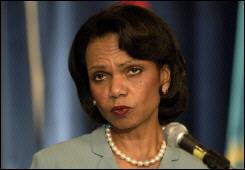Missing Rice

US Secretary of State Condoleezza Rice's decision to skip a Southeast Asian security meeting in Laos this month could further hurt the United States' credentials in the region, analysts said.
It will be the first time in about two decades that a US secretary of state has not attended the annual Association of Southeast Asian (ASEAN) foreign ministers' summit and the ARF, Asia's only official forum on security issues.
Rice, who is expected to visit Africa during the ARF meeting, will be represented by her deputy, Robert Zoellick.
Amitav Acharya, an analyst with the Institute of Defence and Strategic Studies (IDSS) in Singapore, said some Southeast Asian countries will view Rice's absence as a US snub.
"It will send concerns on the level of US engagement, especially in the US support for the war on terror in Southeast Asia," Acharya told AFP.
"After all, the US called Southeast Asia the second front in the war on terror. If you call something the second front and you don't show up to defend it, then you are sending a different signal."
Ernest Bower, a partner with Washington-based consultancy BrooksBowerAsia and a former US-ASEAN Business Council president, said Rice's absence was bad diplomacy that would mask the United States' deep engagement in the region.
"The Americans suffer from bad public relations -- and having the deputy secretary of state attend the ARF and PMC (post-ministerial conference) will add to that perception problem," he said.
"Sadly, not having the secretary of state attend the... meetings will be perceived as a lack of top level US engagement in Southeast Asia.
"So, for the United States, the question remains -- is perception reality? If so, perhaps deploying Secretary Rice would be the right move."
Bower said Zoellick was an old Asia hand who is "virtually a co-secretary of state when it comes to Asia outside of Korea".
"(But) Zoellick cannot fully replace Rice. In truth, the impact is potentially greater on the US than on ASEAN," he said.
IDSS security analyst Andrew Tan said Rice's absence should not come as a surprise because President George W. Bush's unilateral-focused administration had downgraded the importance of multilateral forums like the ARF.
"It's more reflective of the preferences of the current administration in Washington which is, after all, not seeing multilateral institutions in very high regard," Tan told AFP.
From the AFP


0 Comments:
Post a Comment
<< Home